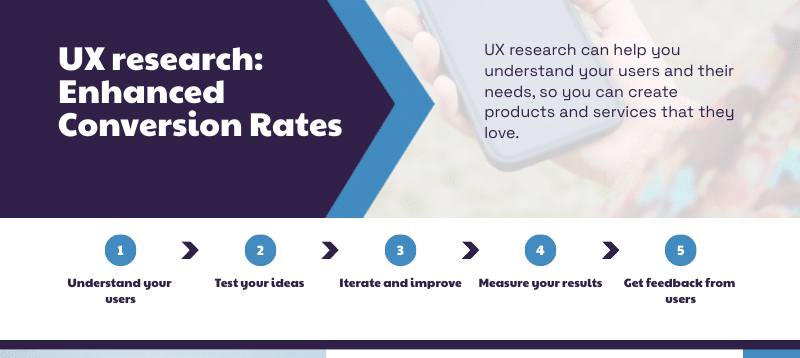
User Experience (UX) has become a pivotal factor in the success of many businesses in modern times, influencing customer satisfaction, brand perception, and user retention. User Experience researchers are the most integral part of a UX team, and their contribution is often overlooked as the end product is of course, the highlight of any production line.
It’s important to know how hiring skilled researchers can also boost business ROI, especially for companies wanting internal UX teams or searching for outsourced researchers. Knowing more about how this kind of research can help boost a business can significantly help in hiring UX teams. In this article, we’ll delve into how User Experience Researchers contribute significantly to business ROI, shedding light on the value they bring to both internal UX teams and companies seeking outsourced researchers.
Overview of UX Research
UX Research is a process that systematically studies target users and their requirements to add realistic contexts and insights to design processes. It encompasses a variety of methods, from usability testing to in-depth interviews, ensuring that user needs are at the forefront of product design and development.
The Impact of User Experience Research on Business ROI
Investing in UX research can notably enhance business ROI by reducing bounce rates, retaining customers, and aligning product designs with user expectations. By applying UX research, users will find products more intuitive and enjoyable, helping build customer loyalty and organic growth. This strategic investment in understanding user needs and behaviors directly correlates with increased sales and market competitiveness.
Enhanced Conversion Rates
User Experience research directly contributes to enhanced conversion rates. Effective research and implementation improve the user journey, increasing engagement and therefore conversion. Conversion may include other key actions such as registration or subscription and media downloads which also contribute to increased returns.
UX research revealed a significant correlation between optimized user experiences and increased conversion rates. By employing user-centric design principles and conducting thorough research into user behaviors and preferences, businesses were able to create websites and applications that provided seamless navigation, intuitive interfaces, and tailored experiences. This approach resulted in higher engagement levels, reduced bounce rates, and ultimately, a notable uplift in conversion rates. The study highlights the pivotal role of UX research in driving tangible business outcomes, underscoring the importance of prioritizing user needs and preferences in design and development processes.
Customer Willingness to Invest
Customers are more likely to trust products that are easy to use and complete their objectives quickly. UX research provides insights into customer preferences and pain points, allowing businesses to tailor their offerings. This customer-centric approach fosters trust and encourages users to “invest” more in a brand as it becomes more relatable and convenient for them.
Unlocking Usability ROI
Including usability improvements in UX research can lead to increased ease of use, reduced user errors, and enhanced customer satisfaction. Better usability can reduce costs for technical support and foster organic recommendation, leading to repeat business and referrals, enabling businesses to profit from usability ROI.
Application of UX Research
Two User Groups: Customers and Employees
UX research for customers focuses on understanding their buying behaviors, preferences, and pain points in usual commercial setups such as B2C. This understanding enables businesses to design products and services that meet and ideally exceed their expectations.
On the other hand, when employees are the users, UX research aims to optimize internal tools and processes. By doing internal UX research on tools and processes employees use, companies can create a substantial positive impact on productivity, training, job satisfaction, and improving the workplace.
Balancing Customer Preferences and Business Value
Using UX research to strike a balance between user satisfaction and business goals enables decision-makers to please customers while maintaining a healthy level of profitability. This can be critical for companies with high-value products to keep the business positioned competitively.
Integrating UX into Business Strategy
Accurate information is critical in creating a business strategy, and insights gained from UX research contribute significantly to the potential of a strategy to succeed. Integrating user-focused actions into business decisions creates competitive differentiation and brings more value to customers.
Brand and Innovation Impact
Improving Brand Reputation
Consistency creates an image in the eyes of customers. A satisfactory user journey and product experience can create waves of positive impact on a brand’s reputation, making users more likely to recommend a brand to others. This is especially amplified on online platforms such as social media, which can help establish a good brand image for the long term.
Increased Innovation
By focusing on user needs and behaviors, User Experience research fosters innovation. It encourages businesses to think outside the box and develop creative solutions to user problems, which can lead to the development of breakthrough products and services.
Other Tasks of User Experience Researchers
User experience researchers have a variety of tasks. Aside from their role in product development, they also do business-side presentations to justify to product owners and decision-makers the potential impact their research can have on the project and the company’s profitability.
Measuring UX Research Impact
To measure the impact of UX research, researchers track key performance indicators (KPIs) like user engagement, conversion rates, and customer satisfaction. These metrics provide tangible evidence of the effectiveness of UX initiatives and guide future research efforts. They are also used as benchmarks for usability tests and measuring business performance aspects.
Expected UX Research Impact on Businesses: The Hard Stats
Businesses can expect a significant impact from UX research. Reports from independent study firms show that every dollar invested in UX brings $100 in return. It can even improve a company’s KPIs in conversion lift to 83%. This is why competitive User Experience researchers can create a huge impact on profitability in the long run.
Key to Securing Buy-In Across the Board
Securing organizational buy-in for UX research is pivotal. By demonstrating how UX impacts key business metrics like conversion rates, customer satisfaction, and retention, stakeholders can see the tangible benefits of investing in user experience. This alignment of UX goals with business objectives is essential for securing the necessary support and resources.
Proving the ROI of UX Research to Leadership
Presenting the ROI data
To prove the ROI of their study, researchers present data-driven evidence of its impact on key business metrics. Reports they present include visualized data regarding product usability pre- and post-development, user feedback and reception, and other relevant factors to the product owners and key stakeholders.
Case Studies and Examples
Case studies presented to leadership and potential clients help illustrate the benefits of their research. They highlight improvements in user satisfaction, usability, and positive results attributed to UX enhancements.
Conclusion
In conclusion, User Experience researchers are highly valuable in improving products and business strategies. Their impact on ROI, customer satisfaction, brand reputation, and product innovation is undeniable. Businesses that embrace UX research and hire efficient, competitive user experience researchers stand to gain a competitive edge, drive innovation, and achieve substantial growth and success.






